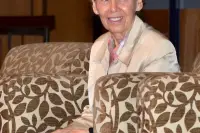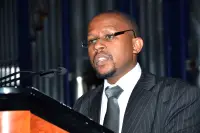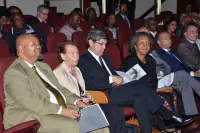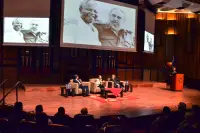
Estela Bravo
Nelson Mandela and Cuban revolutionary leader Fidel Castro had deep respect and affection for each other – and it shines through in Mandela and Fidel, a new documentary by award-winning filmmaker Estela Bravo.
US-born Bravo became a resident of revolutionary Cuba in the 1960s, and came to filmmaking comparatively late in life. She has made dozens of films, most around sensitive social and political issues involving Latin America, the Caribbean and Africa. She has also made acclaimed documentaries about Castro.
The documentary was screened on Tuesday, 25 February 2014 in Unisa’s ZK Matthews Great Hall in Tshwane, as part of the first in a three-part series of Mandela/Fidel Legacy Dialogues. The second will be held later this year in Cuba, and the third in South Africa.
In opening the event, at which Bravo was an honoured guest, Nelson Mandela Foundation CEO Sello Hatang noted that Mandela and Castro always met with the greeting “my brother”.
Cuba had always supported South Africa’s liberation struggle, and even now its support for the country is extensive, said Hatang: “The lesson is: solidarity is a possibility – and it delivers.”
Unisa vice-chancellor Professor Mandla Makhanya noted that the mutual respect that Mandela and Castro felt mirrors the struggles for freedom of their respective countries. He concluded his welcome with a quotation each by the two leaders:
- Castro: “The quality of life lies in knowledge, in culture. Values are what constitute true quality of life, the supreme quality of life, even above food, shelter and clothing”
- Mandela: “A good head and good heart are always a formidable combination. But when you add to that a literate tongue or pen, then you have something very special”

Sello Hatang
Cuban ambassador Carlos Fernandez de Cossio told the gathering that the strong relationship between the two men portrayed in the documentary reflects a relationship between South Africa and Cuba dating back to the early 1960s, at the time of the Cuban revolution.
Cuba was “an early supporter” of South Africa’s struggle, training cadres as early as 1962 and later committing thousands of troops to the war in Angola, of whom 2 000 died “in solidarity with the peoples of Africa”.
“We are proud in Cuba of our relationship with South Africa, and to have South Africa as a friend,” said Fernandez de Cossio.
The documentary begins with Mandela’s attendance of the Namibian independence celebrations in March 1990, only a month following his release. Meeting with top Cuban officials, he says: “We have never doubted that in Cuba, we have a dependable friend.”
He asserts that without Cuba’s involvement in the war in Angola, South Africa would probably still be occupying parts of that country and Namibian independence “would have been very difficult to achieve”.

Unisa vice-chancellor Professor Mandla Makhanya, Estela Bravo, Cuban ambassador Carlos Fernandez de Cossio and Barbara Masekela
It would be more than a year later that Mandela travelled to Cuba, where he was feted everywhere, Castro at his side. In the documentary, Castro tells an audience: “If you want to have an example of a truly honourable man, then this man is Nelson Mandela.”
The documentary continues to follow their relationship for several more years, including Castro’s attendance of Mandela’s presidential inauguration in May 1994. At several stages the audience applauded Mandela’s forthright manner, for example in defending South Africa’s relationship with Cuba, and laughed at his rebuking Castro for not responding to a four-year-old invitation to visit South Africa. A few months later, Castro’s visit took place.
Honoured guest Barbara Masekela, South Africa’s former ambassador to the US and who had accompanied Mandela to Cuba in 1991, said Mandela’s friendship with Castro had been “born in the trenches of the freedom struggle”.
“It’s not unlike the relationship he had with Walter Sisulu, and the relationship he had with Oliver Tambo,” she continued.

Cuban ambassador Carlos Fernandez de Cossio, Estela Bravo and Barbara Masekela during the Q&A session
Masekela hailed Bravo as “a great filmmaker”, saying: “There is a strain that goes through all of her films, and that strain is the collective memory we must all share.”
During a question-and-answer session after the screening, Bravo said that Mandela’s 1991 visit to Cuba had come at a very important time, as socialism worldwide was collapsing, to “show solidarity with Cuba”.
She said South Africa is privileged to have had Mandela, asking: “Who in the world is more loved than Mandela?”
Click here to view a gallery of images from the event.
